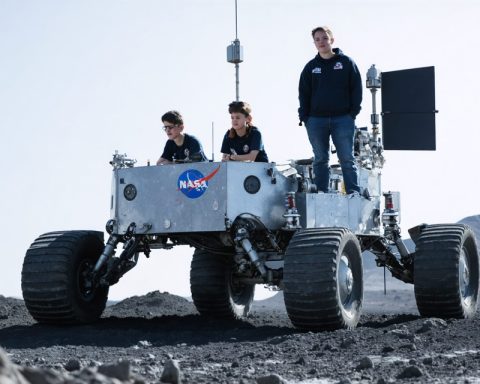A groundbreaking study has unveiled macroscopic organisms existing deep beneath the ocean floor, in one of Earth’s most hostile environments. This significant find challenges existing theories about deep-sea ecosystems, especially around hydrothermal vents, igniting curiosity about the potential for life in extreme conditions both on Earth and beyond.
Utilizing a sophisticated remotely operated vehicle named SuBastian, the research team conducted their exploration approximately 2,515 meters below sea level. They investigated a specific area dubbed the Fava Flow Suburbs, revealing a hidden world of life below the seafloor.
According to one of the study’s co-authors, the findings reveal that marine organisms extend well beyond just the visible seafloor. The researchers documented various species, including specific types of tubeworms, mussels, and other invertebrates, all thriving within the rock cavities. Notably, they found adult tubeworms, illustrating that these environments serve as more than just breeding grounds.
To analyze the undersea habitat, the team extracted vent fluids and measured temperatures, discovering a stable environment for life. These conditions enable macroscopic life forms to flourish despite the extreme depths.
The implications of this study go beyond Earth, contributing vital insights into astrobiology. By understanding how life can manage in harsh realms, scientists aim to inform the search for extraterrestrial organisms potentially residing in similarly challenging environments across the universe.
New Discoveries of Life Thriving in the Ocean’s Abyss: Insights and Implications
Recent explorations of the ocean’s depths have revealed remarkable truths about the organisms that inhabit these unexplored realms. While a groundbreaking study highlighted macroscopic life beneath the ocean floor, further investigations have unearthed additional facts and considerations that deepen our understanding of life in extreme conditions.
Key Questions and Answers
1. What types of life have been discovered in the ocean’s depths?
In addition to tubeworms and mussels, researchers have documented an array of organisms, including unique bacterial colonies, deep-sea fish, and specialized microorganisms, all exhibiting unique adaptations that help them survive in high-pressure, low-light environments.
2. How do these organisms survive in such extreme conditions?
Many of these species have evolved unique biochemical pathways that allow them to metabolize energy from chemical reactions, rather than relying on sunlight. For instance, some bacteria utilize hydrogen sulfide emitted from hydrothermal vents as a primary energy source.
3. What are the implications for astrobiology?
The study of these deep-sea ecosystems sheds light on the potential for life in extraterrestrial environments, such as the subsurface oceans of icy moons like Europa or Enceladus, where similar extreme conditions might prevail.
Challenges and Controversies
The exploration of the deep ocean faces numerous challenges, including technological hurdles, funding limitations, and environmental concerns. Autonomous and remotely operated vehicles are essential for these missions, yet they require significant investment and development. Additionally, the delicate ecosystems being studied are vulnerable to human impact, sparking debate over the balance between discovery and preservation.
Furthermore, some scientists express skepticism about the classifications of certain organisms as “macroscopic.” The term can sometimes be misleading, as many of these creatures may only be visible under specialized equipment, raising questions about the definitions and parameters used in marine biology.
Advantages and Disadvantages
The discovery of life in the ocean’s deepest regions offers several advantages:
– Understanding Biodiversity: These findings enrich our understanding of Earth’s biodiversity and the resilience of life in extreme environments.
– Impacts on Medicine and Technology: Organisms living in such harsh conditions may have compounds that can be useful in medicine and biotechnology, leading to potential advancements.
However, there are also disadvantages:
– Ecological Risks: Increased exploration could lead to disturbances in these fragile ecosystems, potentially harming undiscovered species and disrupting environmental balances.
– Resource Exploitation Concerns: The deep-sea ecosystem may draw interest for resource extraction (such as minerals or pharmaceuticals), posing ethical dilemmas regarding sustainability and conservation.
The quest to understand life beneath the ocean’s abyss continues, raising critical questions that intertwine ecological science and astrobiological exploration. As research progresses, the dialogue about our responsibilities toward these unique environments grows increasingly urgent.
For more information on deep-sea research and discoveries, visit NOAA Ocean Exploration.









